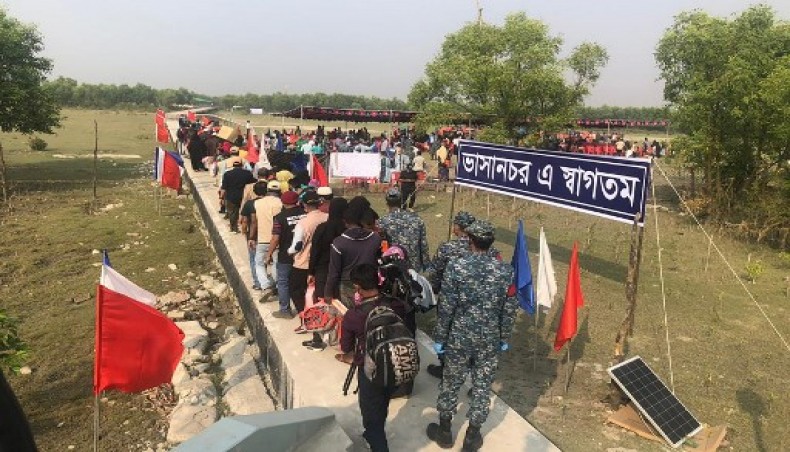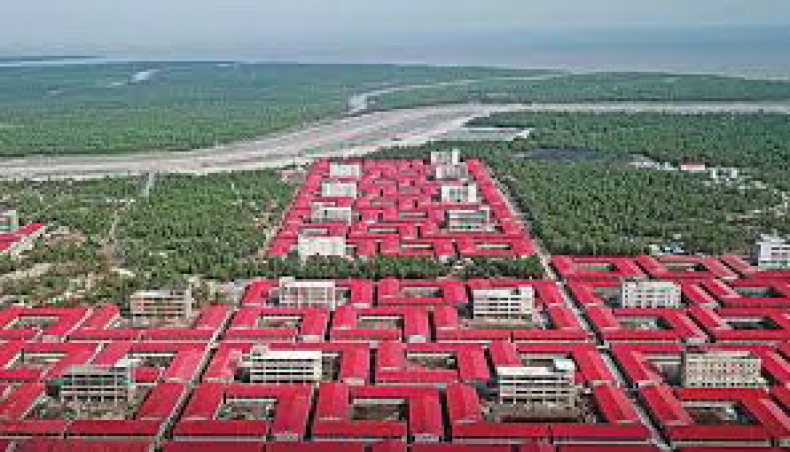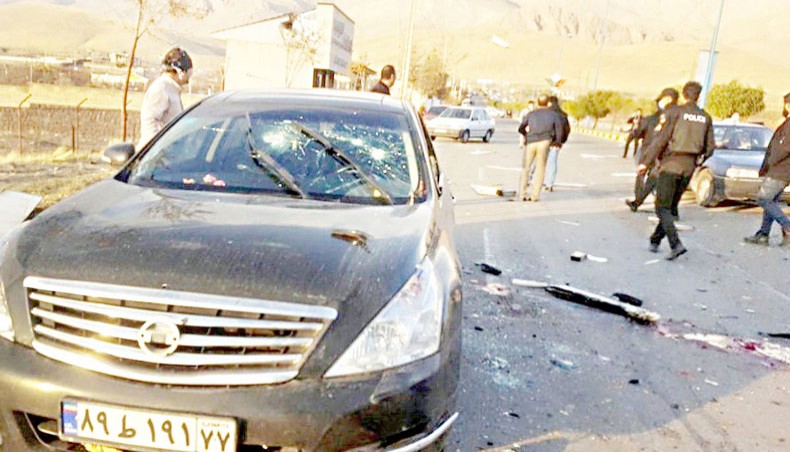Agence France-Presse . Washington | newagebd.net
Published: Dec 11,2020

Rohingya refugees stand in a queue after they disembarked from a Bangladesh Navy ship to the island of Bashar Char in Noakhali on December 4, 2020.- AFP photo
The United States on Thursday voiced concern over Bangladesh’s transfer of Rohingya refugees to a low-lying island and said that any movement should be voluntary.
Bangladesh, which has taken in nearly one million Rohingya who fled a brutal offensive in neighbouring Myanmar, has started the relocation of 1,00,000 of them from squalid camps on the mainland to Bhashan Char, a silt island frequently in the path of cyclones.
The United States reiterated its appreciation to Bangladesh for accepting the refugees but said it was ‘concerned’ about last week’s transfer of more than 1,600 Rohingya and plans to move more.
‘The United States concurs with the UN that any such relocations must be fully voluntary and based on informed consent without pressure or coercion,’ State Department spokesman Cale Brown said in a statement.
UN spokesman Stephane Dujarric earlier pointed to reports, corroborated by accounts on the ground to AFP, that refugees have been pressured into relocating.
Related Coverage:
› UN recognises investment in Bhasan Char: Mia Seppo
› Bhasan Char receives 1,642 Rohingyas
Bangladesh’s foreign minister AK Abdul Momen called the claims ‘a damn lie’ and said facilities on the island were ‘much better’ than the camps.
The United States called for Bangladesh to allow ‘thorough and independent technical and protection assessments’ of Bhashan Char to determine whether the island, said to be prone to flooding, is suitable for refugees.
The US statement comes after outgoing president Donald Trump slashed his country’s own refugee admissions to a record low, with the wealthiest nation planning to admit no more than 15,000 from around the world in the current fiscal year.
The State Department said the United States is the leading supporter of refugee programs inside Bangladesh, contributing $962 million since 2017.
The United States also reiterated calls on Myanmar to allow the return of the refugees — a prospect that few see as immediate.
The Buddhist-majority nation refuses to consider the mostly Muslim Rohingya as citizens and in 2017 launched a military campaign in which refugees recounted mass killings, widespread rape and the burning of villages

Rohingya refugees stand in a queue after they disembarked from a Bangladesh Navy ship to the island of Bashar Char in Noakhali on December 4, 2020.- AFP photo
The United States on Thursday voiced concern over Bangladesh’s transfer of Rohingya refugees to a low-lying island and said that any movement should be voluntary.
Bangladesh, which has taken in nearly one million Rohingya who fled a brutal offensive in neighbouring Myanmar, has started the relocation of 1,00,000 of them from squalid camps on the mainland to Bhashan Char, a silt island frequently in the path of cyclones.
The United States reiterated its appreciation to Bangladesh for accepting the refugees but said it was ‘concerned’ about last week’s transfer of more than 1,600 Rohingya and plans to move more.
‘The United States concurs with the UN that any such relocations must be fully voluntary and based on informed consent without pressure or coercion,’ State Department spokesman Cale Brown said in a statement.
UN spokesman Stephane Dujarric earlier pointed to reports, corroborated by accounts on the ground to AFP, that refugees have been pressured into relocating.
Related Coverage:
› UN recognises investment in Bhasan Char: Mia Seppo
› Bhasan Char receives 1,642 Rohingyas
Bangladesh’s foreign minister AK Abdul Momen called the claims ‘a damn lie’ and said facilities on the island were ‘much better’ than the camps.
The United States called for Bangladesh to allow ‘thorough and independent technical and protection assessments’ of Bhashan Char to determine whether the island, said to be prone to flooding, is suitable for refugees.
The US statement comes after outgoing president Donald Trump slashed his country’s own refugee admissions to a record low, with the wealthiest nation planning to admit no more than 15,000 from around the world in the current fiscal year.
The State Department said the United States is the leading supporter of refugee programs inside Bangladesh, contributing $962 million since 2017.
The United States also reiterated calls on Myanmar to allow the return of the refugees — a prospect that few see as immediate.
The Buddhist-majority nation refuses to consider the mostly Muslim Rohingya as citizens and in 2017 launched a military campaign in which refugees recounted mass killings, widespread rape and the burning of villages
UNHCR seeks access to Bhasan Char
Shahidul Islam Chowdhury | Published: Dec 08,2020 | newagebd.net
The UN High Commissioner for Refugees Filippo Grandi has sought access for the UN partners, including the UNHCR, to the Rohingya people who have been relocated to the Bhasan Char island.
‘UNHCR and UN partners seek access to them in order to hear their voices, understand their wishes and see conditions on the island,’ Filippo Grandi said in a tweet, adding that any transfer must follow a voluntary and informed decision.
The Bangladesh government has recently relocated a total of 1,642 displaced Rohingya people of Myanmar to Bhasan Char from Cox’s Bazar camps amid concerns of the UN offices in Bangladesh and protest from several foreign rights bodies.
Over 300 other Rohingya people, who were rescued from boats in the Bay of Bengal from traffickers, have also been taken to the island earlier.
The government has been providing humanitarian relief support to all the Rohingya people in Bhasan Char through the Office of the Refugee Relief and Repatriation Commissioner’s Office, additional RRRC Shamsud Douza told New Age on Tuesday.
Foreign minister AK Abdul Momen on Monday said that the UN should help the Rohingyas in Bhasan Char in accordance with the mandate on the basis of which the UN worked in Bangladesh.
‘They should follow the mandate. It doesn’t matter where they’re [victims] living,’ he said.
The minister, however, made it clear that the arrangement made in Bhasan Char was for a short period as the prime objective of the government was to repatriate the displaced Rohingya people to their ancestral homes in Rakhine of Myanmar.
Asked whether the UNHCR has formally sought access to the island, it’s spokesperson Louise Donovan said on Tuesday, ‘The UN has been consistent in seeking access to Bhasan Char and to the refugees. We look forward to continuing a constructive dialogue with the government regarding its Bhasan Char project, including the proposed UN technical and protection assessments.’
The recent relocation was the first phase of transfer to the island as the government would take there about 100,000 members of the community to decongest existing camps situated in areas adjacent to borders with Myanmar.
The relocation of a section of Rohingya people from camps in Cox’s Bazar to the 13,000-acre Bhasan Char facility that was developed with all amenities, including embankments to withstand natural disasters such as cyclones and tidal waves, at a cost of more than US$350 million was essential to decongest camps on the security grounds, said the Bangladesh government.
Some 8,60,000 Rohingyas, mostly women, children and aged people, entered Bangladesh fleeing unbridled murder, arson and rape during ‘security operations’ by the Myanmar military in Rakhine, what the United Nations has denounced as ethnic cleansing and genocide, beginning from August 25, 2017.
The latest Rohingya influx has taken the number of undocumented Myanmar nationals and registered refugees from that country in Bangladesh to over 1.1 million, according to estimates by UN agencies and Bangladesh foreign ministry.
Not a single Rohingya has returned to their home in Rakhine as the Myanmar government has almost stalled the Rohingya reparation process resorting to various means, including near discontinuation of clearing of names of the refugees eligible to go back to the country, and an unwillingness to hold meetings of the bilateral joint working group and the tripartite mechanism led by China.
Shahidul Islam Chowdhury | Published: Dec 08,2020 | newagebd.net
The UN High Commissioner for Refugees Filippo Grandi has sought access for the UN partners, including the UNHCR, to the Rohingya people who have been relocated to the Bhasan Char island.
‘UNHCR and UN partners seek access to them in order to hear their voices, understand their wishes and see conditions on the island,’ Filippo Grandi said in a tweet, adding that any transfer must follow a voluntary and informed decision.
The Bangladesh government has recently relocated a total of 1,642 displaced Rohingya people of Myanmar to Bhasan Char from Cox’s Bazar camps amid concerns of the UN offices in Bangladesh and protest from several foreign rights bodies.
Over 300 other Rohingya people, who were rescued from boats in the Bay of Bengal from traffickers, have also been taken to the island earlier.
The government has been providing humanitarian relief support to all the Rohingya people in Bhasan Char through the Office of the Refugee Relief and Repatriation Commissioner’s Office, additional RRRC Shamsud Douza told New Age on Tuesday.
Foreign minister AK Abdul Momen on Monday said that the UN should help the Rohingyas in Bhasan Char in accordance with the mandate on the basis of which the UN worked in Bangladesh.
‘They should follow the mandate. It doesn’t matter where they’re [victims] living,’ he said.
The minister, however, made it clear that the arrangement made in Bhasan Char was for a short period as the prime objective of the government was to repatriate the displaced Rohingya people to their ancestral homes in Rakhine of Myanmar.
Asked whether the UNHCR has formally sought access to the island, it’s spokesperson Louise Donovan said on Tuesday, ‘The UN has been consistent in seeking access to Bhasan Char and to the refugees. We look forward to continuing a constructive dialogue with the government regarding its Bhasan Char project, including the proposed UN technical and protection assessments.’
The recent relocation was the first phase of transfer to the island as the government would take there about 100,000 members of the community to decongest existing camps situated in areas adjacent to borders with Myanmar.
The relocation of a section of Rohingya people from camps in Cox’s Bazar to the 13,000-acre Bhasan Char facility that was developed with all amenities, including embankments to withstand natural disasters such as cyclones and tidal waves, at a cost of more than US$350 million was essential to decongest camps on the security grounds, said the Bangladesh government.
Some 8,60,000 Rohingyas, mostly women, children and aged people, entered Bangladesh fleeing unbridled murder, arson and rape during ‘security operations’ by the Myanmar military in Rakhine, what the United Nations has denounced as ethnic cleansing and genocide, beginning from August 25, 2017.
The latest Rohingya influx has taken the number of undocumented Myanmar nationals and registered refugees from that country in Bangladesh to over 1.1 million, according to estimates by UN agencies and Bangladesh foreign ministry.
Not a single Rohingya has returned to their home in Rakhine as the Myanmar government has almost stalled the Rohingya reparation process resorting to various means, including near discontinuation of clearing of names of the refugees eligible to go back to the country, and an unwillingness to hold meetings of the bilateral joint working group and the tripartite mechanism led by China.
Rights groups urge Bangladesh to halt Rohingya relocation
Staff Correspondent | Published: Dec 03,2020
(newagebd.net)

International rights groups Amnesty International and Human Rights Watch on Thursday urged Bangladesh authorities to immediately halt a plan of relocating the Rohingya refugees to Bhasan Char Island.
‘The authorities should immediately halt relocation of more refugees to Bhashan Char, return those on the island to their families and community in mainland Bangladesh, and follow due process including the full and meaningful participation of refugees in any plan for their relocation,’ London-based Amnesty International’s South Asia campaigner, Saad Hammadi said in the statement.
In separate statement, New York-based Human Rights Watch’s Asia director Brad Adams said Bangladesh government was actively reneging on its promise to the UN not to relocate any refugees to Bhasan Char island until humanitarian experts give a green light.
‘If the government were genuinely confident in the habitability of the island, they would be transparent and not hastily circumvent UN technical assessments,’ he said.
The AI and HRW statements came amid reports of a government plan to start the relocation of some 4,000 refugees to Bhasan Char next week, though Bangladesh authorities were yet to announce any date.
‘The relocation of so many Rohingya refugees to a remote island, which is still off limits to everyone including rights groups and journalists without prior permission, poses grave concerns about independent human rights monitoring,’ said Hammadi.
‘It is crucial that the Bangladeshi authorities must let the UN, rights groups and humanitarian agencies carry out independent assessments of Bhashan Char’s habitability first before taking any steps to relocate people there. No relocation plan, either to Bhashan Char or to another location, can be undertaken without the full and informed consent of the individuals involved,’ he added.
‘Some refugees already on the island have shared their anxiety with Amnesty International at being cut off from their families and community.
‘Bangladesh and other members of the international community have a critical role not only in protecting the rights of the Rohingya people but also in ensuring their full and meaningful participation in decisions that affect them.’
Bhashan Char is a silt island developed by the Bangladesh Navy, where the Bangladeshi authorities plan to relocate 100,000 Rohingya refugees.
Human Rights Watch said it recently spoke with 12 families, who said their names were on the list, but that they had not willingly volunteered to relocate. Some refugees on the list have fled out of fear of forced relocation.
In a statement on December 2, the United Nations said that it had not been involved in preparation for this transfer to Bhasan Char and that ‘any relocations to Bhasan Char should be preceded by comprehensive technical protection assessments,’ reiterating that the UN stood ready to proceed with such assessments ‘if permitted by the Government.’
European Union Ambassador Rensje Teerink said that the EU would not comment on relocation to Bhasan Char until the UN had been allowed to complete technical and humanitarian missions to the island.
Staff Correspondent | Published: Dec 03,2020
(newagebd.net)

International rights groups Amnesty International and Human Rights Watch on Thursday urged Bangladesh authorities to immediately halt a plan of relocating the Rohingya refugees to Bhasan Char Island.
‘The authorities should immediately halt relocation of more refugees to Bhashan Char, return those on the island to their families and community in mainland Bangladesh, and follow due process including the full and meaningful participation of refugees in any plan for their relocation,’ London-based Amnesty International’s South Asia campaigner, Saad Hammadi said in the statement.
In separate statement, New York-based Human Rights Watch’s Asia director Brad Adams said Bangladesh government was actively reneging on its promise to the UN not to relocate any refugees to Bhasan Char island until humanitarian experts give a green light.
‘If the government were genuinely confident in the habitability of the island, they would be transparent and not hastily circumvent UN technical assessments,’ he said.
The AI and HRW statements came amid reports of a government plan to start the relocation of some 4,000 refugees to Bhasan Char next week, though Bangladesh authorities were yet to announce any date.
‘The relocation of so many Rohingya refugees to a remote island, which is still off limits to everyone including rights groups and journalists without prior permission, poses grave concerns about independent human rights monitoring,’ said Hammadi.
‘It is crucial that the Bangladeshi authorities must let the UN, rights groups and humanitarian agencies carry out independent assessments of Bhashan Char’s habitability first before taking any steps to relocate people there. No relocation plan, either to Bhashan Char or to another location, can be undertaken without the full and informed consent of the individuals involved,’ he added.
‘Some refugees already on the island have shared their anxiety with Amnesty International at being cut off from their families and community.
‘Bangladesh and other members of the international community have a critical role not only in protecting the rights of the Rohingya people but also in ensuring their full and meaningful participation in decisions that affect them.’
Bhashan Char is a silt island developed by the Bangladesh Navy, where the Bangladeshi authorities plan to relocate 100,000 Rohingya refugees.
Human Rights Watch said it recently spoke with 12 families, who said their names were on the list, but that they had not willingly volunteered to relocate. Some refugees on the list have fled out of fear of forced relocation.
In a statement on December 2, the United Nations said that it had not been involved in preparation for this transfer to Bhasan Char and that ‘any relocations to Bhasan Char should be preceded by comprehensive technical protection assessments,’ reiterating that the UN stood ready to proceed with such assessments ‘if permitted by the Government.’
European Union Ambassador Rensje Teerink said that the EU would not comment on relocation to Bhasan Char until the UN had been allowed to complete technical and humanitarian missions to the island.

